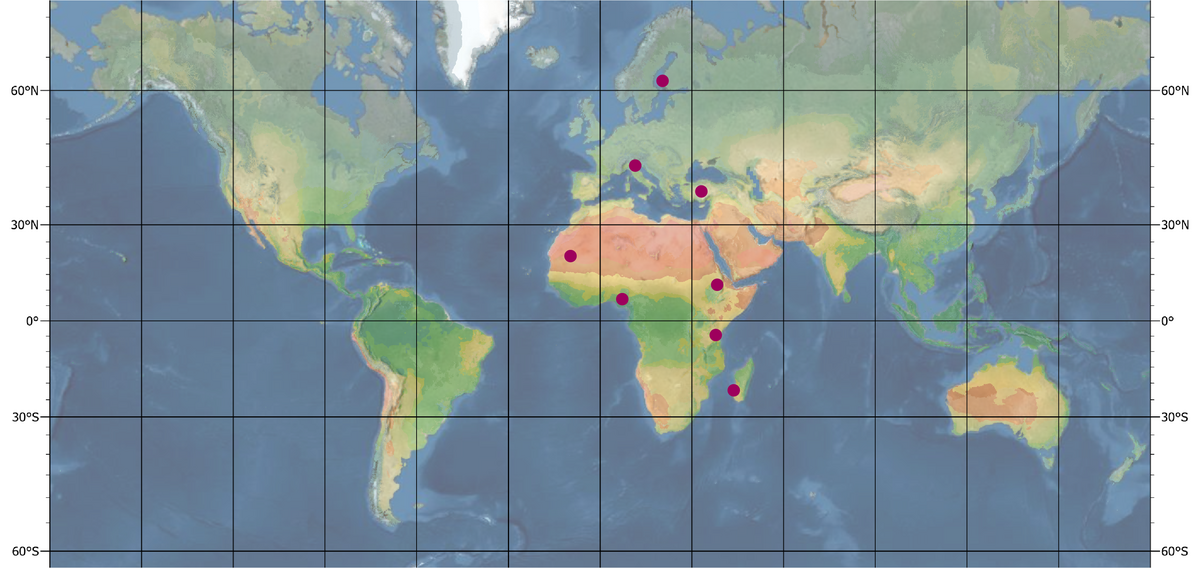Date: 30 June 2022
Time: 8:30-16:30
Venue: Centre for Urban Network Evolutions (UrbNet), Moesgård Allé 20, building 4230-232, DK-8270 Højbjerg

As the pace of global climate change is accelerated, questions revolving around the dynamic, long-term relationship between communities and their environment are widely debated across disciplines in the humanities, social, and natural sciences and are increasingly attracting the attention of the general public.
This scholarship is characterized by a Northern Hemisphere bias, with comparatively less focus on reconstructing human responses to paleoclimatic shifts in the Southern Hemisphere. This overreliance on Northern Hemisphere examples is particularly problematic when reconstructions of purportedly global processes are largely based on case studies from northern latitudes.
While sampling case studies across a latitudinal transect (Fig. 1), this workshop seeks to especially highlight the unique challenges encountered by researchers working in the Southern Hemisphere, with comparatively fewer robust datasets, climate archives, and models devoted to understanding community responses to paleoclimatic shifts.
Our primary goal is to explore ways of achieving methodological consistency and robust comparison around models of human responses to extreme or unpredictable climatic shifts. We argue that variability in human responses can best be understood by capturing both geographic and cultural variability. As such, case studies integrated into this workshop will aim for cross-latitudinal and cross-cultural representation by bringing together scholars working from Arctic to Subtropical environments. We will further nuance paleoclimatic models by including multi-scalar perspectives which incorporate datasets that represent responses at different household, community, and societal levels.
Relatedly, we will formulate a set of the affiliated changes correlated with climatic shifts that we would expect to see in the archaeological record. These expectations would take into consideration regional differences as impacted by local socio-political, cultural, and environmental particulars. Furthermore, models would account for the types of fluctuations communities are perennially accommodating without suffering systemic changes. Why does systemic fragmentation or collapse occur when previously the same system was resilient under pressure? We will seek to identify the archaeological proxies associated with changes in social processes such as subsistence strategies, food storage, network structure, mobility, migration, conflict and other relevant correlates of risk management in response to paleoclimatic shifts. A standardized set of expectations around diagnostic archaeological proxies for risk management would also allow us to propose new directions for future research that may fill existing gaps.
This workshop expands the scope of current research being conducted at UrbNet and in the Department of Archaeology and Heritage Studies at Aarhus University, where the impacts of climatic and environmental pressures on the fabric of urban networks, where present, village communities, or other manifestations of socio-political organization are being studied.
For invited (non-AU) speakers, up to two nights of accommodation will be covered as well as travel expenses. Please book your own travel to Aarhus, and we will reimburse you after your stay. Please note that we can only reimburse economy-class tickets booked directly through an airline and not via a search engine. We would also appreciate it if you could book sooner rather than later, in order to get a reasonably priced flight. Please confirm the price of your travel with us before you book.
As soon as you have booked your flight, please forward your itinerary to Mie Egelund Lind (melind@cas.au.dk), so that the hotel booking can be confirmed.
After the event, you will receive a link to AU’s online travel reimbursement form. It is important that you keep your receipts, as you will need to provide documentation for expenses.
Hotel Scandic The Mayor
Banegårdspladsen 14
DK-8000 Aarhus C
Phone: +45 87 32 01 00
Website
We will host a dinner for speakers 30 June at Restaurant MellemRum and will of course cater for you during the workshop. For sustainability reasons, we strive to serve only vegetarian meals.
NOTE: If you have any dietary restrictions (incl. allergies), please let Mie Egelund Lind (melind@cas.au.dk) know, so that the restaurant and caterers can be notified.